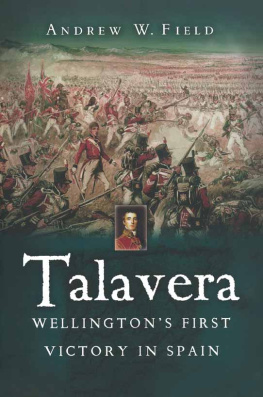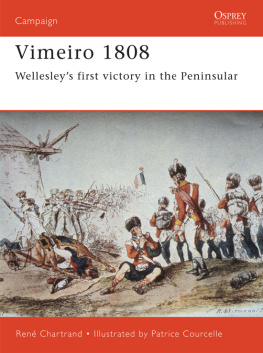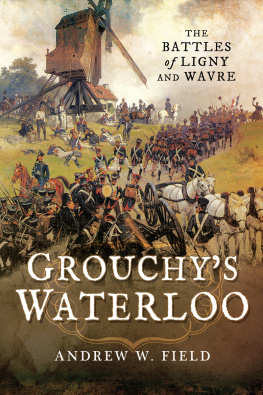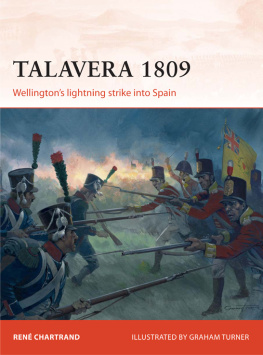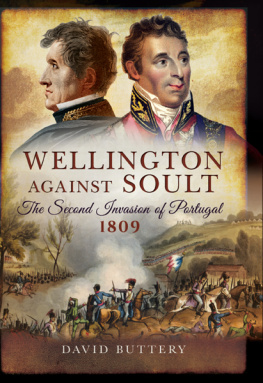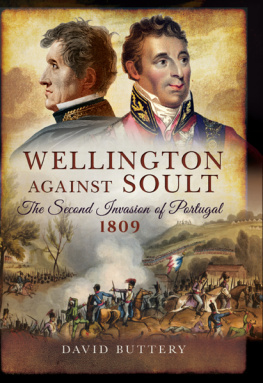Talavera
Wellingtons First Victory in Spain
Talavera
Wellingtons First Victory in Spain
Andrew W. Field
In memory of a loving mother
First published in Great Britain in 2006 by
Pen & Sword Military
an imprint of
Pen & Sword Books Ltd
47 Church Street
Barnsley
South Yorkshire
S70 2AS
Copyright Andrew Field 2006
ISBN 1-84415-268-5
The right of Andrew Field to be identified as
Author of the Work has been asserted by
him in accordance with the Copyright, Designs
and Patents Act 1988.
A CIP catalogue record for this book is
available from the British Library
All rights reserved. No part of this book may be reproduced or transmitted in any form or by any means, electronic or mechanical including photocopying, recording or by any information storage and retrieval system, without permission from the Publisher in writing.
Typeset in 11/13pt Plantin by Mac Style, Nafferton, E. Yorkshire
Printed and bound in England by CPI UK
Pen & Sword Books Ltd incorporates the Imprints of Pen & Sword Aviation, Pen & Sword Maritime, Pen & Sword Military, Wharncliffe Local History, Pen & Sword Select, Pen and Sword Military Classics and Leo Cooper.
For a complete list of Pen & Sword titles, please contact
Pen & Sword Books Limited
47 Church Street, Barnsley, South Yorkshire, S70 2AS, England
E-mail : enquiries@pen-and-sword.co.uk
Website: www.pen-and-sword.co.uk
Contents
Ironically, it was while touring battlefields of the Spanish Civil War that I first visited Talavera. As the group were not too far from that town I stole away to visit a battlefield where two of the predecessors of my own regiment, the Worcestershire and Sherwood Foresters Regiment (29th/45th Foot), had fought nearly 200 years before. I had little knowledge of the battle before this visit but, inspired by how little the area has changed, I determined to find out more. I was surprised to find that it was the only major battle of the Peninsular War that didnt appear to have a single volume dedicated to it.
When I began this book my aim was not to write the definitive study of the battle, rather a comprehensive account that would serve as useful background for a satisfying visit to the battlefield. My researches, however, revealed more and more detail that I felt obliged to include, and the account is probably the most detailed and accurate that is currently available. While I have made every effort to follow the true course of the battle I have deliberately left out speculation and rumour, and have tried to examine the evidence available on the more controversial or contentious events.
I have used the excellent volumes of Sir Charles Omans A History of the Peninsular War as the bedrock of my narrative. His impressive account, written about 100 years ago, is acknowledged as the best researched, and consequently the most accurate, of the multi-volume histories. While Colonel Napiers History of the War in the Peninsula is an easier and rather more exciting read, it has a strong jingoistic theme, and his account of Talavera is rather superficial.
Since Omans work on the Talavera campaign was written, a myriad of memoirs and first-hand accounts have been published that were not available to him. I have incorporated these into my own narrative and used them where safe to amend Omans own account. Fortescues History of the British Army is a mine of interesting detail, but regrettably he rarely gives the source of his information and it is impossible to be sure if some of it is merely speculation. Needless to say, Wellingtons dispatches form a vital and fascinating source of dependable information and are vital to an understanding of the campaign in the wider political, as well as military, context.
Oman became famous for his essay on the column v. line tactical debate, and his views were perpetuated for many years. While his arguments have recently been accepted as flawed, they only reflected his own lack of military experience and the conceited British view of their own military superiority that was typical of the time in which he wrote. However, as some knowledge of the tactical systems used by each side is fundamental to the understanding of how a battle was fought, I have rather indulged my own interest in this topic. My discussion on tactics is based purely on my own interpretation of extensive research and study and may prove equally contentious to some, but I trust it will enhance the readers understanding of how and why each side fought the way it did.
In contrast to the many British memoirs there are few French first-hand accounts of the battle from more junior ranks. Girod de lAin offers perhaps the most detailed and balanced, and his account of the night attack is fascinating and vivid. Otherwise we must depend on the accounts of King Joseph and Marshal Jourdan, his chief of staff. Unfortunately these reflect their need to justify their failure to Napoleon rather than to present an accurate and balanced account of the battle. Contemporary and later French historians, while critical of the French performance, also spend rather too much space finding excuses for the defeat or painting it as a victory.
Spanish accounts of the campaign are hard to come by and as I have difficulty in pronouncing the Spanish word for beer I have not been in a position to pursue one with any confidence! My only excuse was that while they had a major impact on the campaign, they took little part in the fighting at Talavera, and that is where the emphasis of this book lies.
It would be remiss of me not to offer a word of thanks to some of the many people who have helped and encouraged me in the preparation of this book. In particular I would like to thank Ze Marsh and Debra Gill of the Sennelager library for their unstinting enthusiasm and efficiency in feeding my insatiable quest for various books and sources, and the staff of the Prince Consorts Library in Aldershot. Jacqui Minchinton put in many hours in the archives at the museum of the Northamptonshire Regiment, and Corporal Gorman at the Regimental Headquarters of the Scots Guards provided the key to tracking down the picture of the 1/3rd Guards at the battle. Thanks are due also to Griff Rhys-Evans, my Spanish speaker who tried hard to supply more detail on the Spanish contribution to the battle, and last but not least to my wife, Paula, for her patient encouragement and critical reading.
In October 1807, aided and abetted by their erstwhile Spanish allies, the French invaded Portugal. Militarily ill-prepared to meet the conquerors of most of Europe, this small country offered no resistance, and its royal family fled to Brazil in British warships. It was Portugals continuing friendship with Great Britain that had led to its misfortune; its refusal to support Napoleons Continental System to exclude British trade with Europe had been all the reason the Emperor of France needed to extend his hegemony still further.
Spains connivance in its neighbours downfall was not enough to save it from a similar fate. Early in 1808 Napoleon invaded Spain with the support of its heir apparent, Ferdinand. However, tricked into entering France soon afterwards, he was taken prisoner and exiled to Valenay. Napoleon declared his brother Joseph as king in Ferdinands place but the Spanish people rose in spontaneous revolt. A revolutionary junta based in Seville approached Britain for money and arms. In July of that year Lieutenant General Sir Arthur Wellesley sailed from Cork with an advance guard of 14,000 British troops who were to be reinforced with a further 16,000.
Next page
